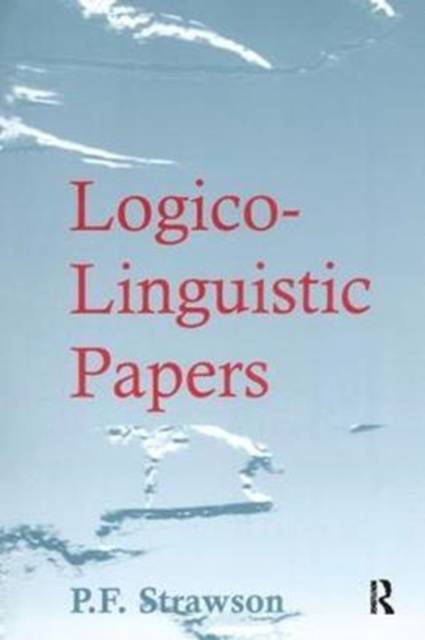
Door een staking bij bpost kan je online bestelling op dit moment iets langer onderweg zijn dan voorzien. Dringend iets nodig? Onze winkels ontvangen jou met open armen!
- Afhalen na 1 uur in een winkel met voorraad
- Gratis thuislevering in België vanaf € 30
- Ruim aanbod met 7 miljoen producten
Door een staking bij bpost kan je online bestelling op dit moment iets langer onderweg zijn dan voorzien. Dringend iets nodig? Onze winkels ontvangen jou met open armen!
- Afhalen na 1 uur in een winkel met voorraad
- Gratis thuislevering in België vanaf € 30
- Ruim aanbod met 7 miljoen producten
Zoeken
Omschrijving
P.F. Strawson has been a major and influential spokesman for ordinary language philosophy throughout the late twentieth century, studying the relationship between common language and the language of formal logic. This reissue of his collection of early essays, Logico-Linguistic Papers, is published with a brand new introduction by Professor Strawson but, apart from minor corrections to the text, these classic essays remain original and intact. Logico-Linguistic Papers contains Strawson's major essay, 'On Referring', in which he disputed Bertrand Russell's theory of definite descriptions, distinguishing between referring to an entity and asserting its existence. The book contains twelve essays in all, grouped by subject matter. The first five are concerned with the topic of singular reference and predication and the last three are all responses to J.L. Austin's treatment of the topic of truth. Strawson disputes the correspondence theory of truth, maintaining that facts are what statements (when true) state. The remaining papers deal with meaning, speech acts, logical truth and Chomsky's views on syntax.
Specificaties
Betrokkenen
- Auteur(s):
- Uitgeverij:
Inhoud
- Aantal bladzijden:
- 210
- Taal:
- Engels
Eigenschappen
- Productcode (EAN):
- 9781138424555
- Verschijningsdatum:
- 28/06/2017
- Uitvoering:
- Hardcover
- Formaat:
- Genaaid
- Afmetingen:
- 156 mm x 233 mm
- Gewicht:
- 452 g

Alleen bij Standaard Boekhandel
+ 486 punten op je klantenkaart van Standaard Boekhandel
Beoordelingen
We publiceren alleen reviews die voldoen aan de voorwaarden voor reviews. Bekijk onze voorwaarden voor reviews.











